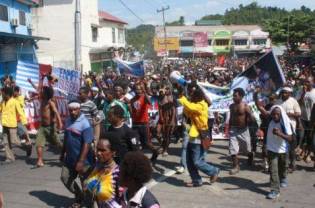Nivell Rayda | August 30, 2010
 Experts expressed concerns on Monday that demonstrations in Papua, in this file photo, will become more heated unless the government engages with the Papuan people. (AFP Photo/Banjir Ambarita)
Experts expressed concerns on Monday that demonstrations in Papua, in this file photo, will become more heated unless the government engages with the Papuan people. (AFP Photo/Banjir Ambarita)Jakarta.
The government must rethink its relationship with Papua as soon as possible if it wants to avoid further civil violence and more adamant calls for independence, activists and social scientists have said.
“If security conditions in Papua could be equated to a volcano, a violent eruption is due very soon,” said Amiruddin al Rahab, of the civil-society Papua Working Group (Pokja Papua).
Amiruddin said on Monday that Papuans felt excluded from government policies and economic programs aimed at bringing prosperity to the province.
“Programs from Jakarta have not addressed the real problems in Papua — namely the need for health care, education and economic empowerment,” Amiruddin said.
“Papuans want their voices heard. The government needs to stage a balanced and mutual discussion with Papuans.”
Ikrar Nusa Bhakti, a senior researcher from the Indonesian Institute of Sciences, said that massive investment and exploitation of the natural resources in Papua had led to resentment of outsiders, both foreigners and other Indonesians.
“Immigrants coming to Papua from Java and elsewhere have better work opportunities and access to education, creating social and economic disparities. For the Papuans, money coming from Jakarta or abroad only means environmental destruction,” he said.
But he pointed out that dialogue with the government may be difficult because of Papua’s decentralized population.
“Papua consists of many tribes and communities. Finding a figure that can be accepted collectively [to speak for] the Papuans is difficult,” Ikrar said.
Ikrar said internationally sponsored talks like those that took place between Indonesia and former combatants in the Free Aceh Movement (GAM) might not work due to the lack of a unifying figure.
“The government must instead appoint a team that can reach out directly to the Papuans and conduct negotiations with them,” he said.
Poengky Indarti, executive director of human rights group Imparsial, said that the government had a history of violence toward Papuans that had already soured relations.
“Every time the Papuans express their voices against social and economic injustices, the military automatically views it as an act of treason or separatism,” Poengky said.
“There are countless demonstrations that have ended with the military or police using excessive force and violence. This has led to resentment toward the central government, particularly knowing that not a single perpetrator of violence has been prosecuted.”
A report published by the University of Sydney’s Center for Peace and Conflict Studies last month warned that a repeat of the 1991 East Timor massacre was likely to occur in Papua, after calls for an internationally sponsored referendum of independence intensified.
The report predicted that as Papuans grew restless about their conditions they would stage large-scale demonstrations, risking increasingly violent military responses.
